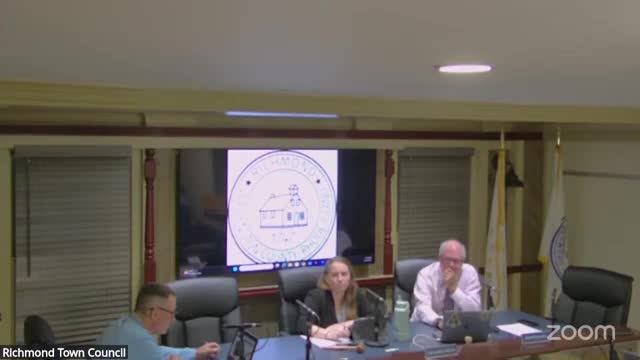Council approves MOU for town-managed OpenGov fire permitting and adds fire inspection fees to ordinance
Get AI-powered insights, summaries, and transcripts
Subscribe
Summary
Town council authorized a memorandum of understanding with Richmond Carolina and Hope Valley fire districts to keep fire-permit processing on the town's OpenGov platform, add an administrative fee to reimburse the town, and authorized advertising an ordinance amendment to add fire plan review and inspection fees to the town fee schedule.
The Richmond Town Council voted unanimously to approve a memorandum of understanding letting the town continue to manage fire-permit transactions for Richmond Carolina and Hope Valley fire districts through the town's OpenGov online permitting platform and to advertise a change to the town fee schedule to include fire inspection fees.
Council members said the change formalizes practices already in place and ensures the town is reimbursed for administrative work. The town administrator said the state has mandated certain permitting modules be online and that the town has been collecting fire permit fees and reporting them to the state for roughly six months, creating jurisdictional and billing questions that the MOU aims to resolve.
Under the MOU, the town will receive the consolidated billing from the state and remit fees to the appropriate fire entity; the town will retain a modest administrative fee to cover IT, staff time, printing and check stock. Administration said the arrangement was created as a convenience for residents and to ensure a single point of billing and reporting; it will be reviewed each budget cycle. Council also authorized advertising a proposed amendment to Richmond Town Code of Ordinances 3.6 (Fee Schedule) to include fire plan review and inspection fees and publish a notice for a public hearing.
Councilors asked staff to ensure clear roles and a single intake process that alerts both fire chiefs and marshals when an application is submitted. The interim town administrator said the platform now sends simultaneous notifications to both chiefs and both marshals and that the town will open a dedicated account to collect administrative fees and track volume for future staffing needs.
The motion to approve the MOU passed on a roll call vote with Councilor Dinsmore, Councilor Reynolds and the council president voting yes. The vote to authorize advertisement of the fee ordinance amendment also passed on a roll call vote.
The council and staff said the town will continue to monitor the state reimbursement program; staff noted the current state reimbursement is expected this year but future payments depend on state budget decisions.
